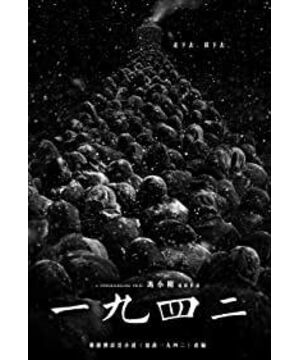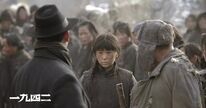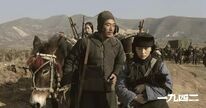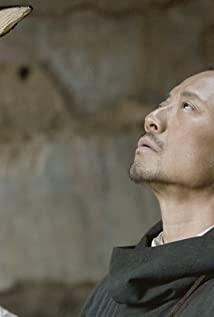Different from the general films that describe the fate of ordinary people in the context of big history, "1942" is a film that unfolds on both macro and micro lines at the same time. The micro-line is the story of the two villagers headed by the "old club" who couldn't bear the famine and fled thousands of miles, while the macro-line shows the then National Government, the Henan Provincial Government and the Supreme Commander of the First War Zone to which Henan belonged. Various games and disputes over the issue of famine.
As far as the microscopic line is concerned, Feng Xiaogang used a group of old dramas with superb performances and extremely shocking and infectious video language to interpret the story of the "1942" version of "Alive" for us: two families In the process of fleeing the famine for thousands of miles, he continued to encounter the pain of loss. First, he lost his wealth, and then he lost his food for survival. Finally, members of his family fell and left one by one. Many details in the process of escaping the famine are worth pondering carefully: for example, the blind deer family can abandon a lot of luggage, but no matter where they go, they do not forget to protect the ancestral tablets of their own family; In the case of being unable to eat, facing the baby boy born by his daughter-in-law, he is still ecstatic that his family's bloodline will continue; Shuanzhu is under pressure from the bayonet of the Japanese soldiers, and at the juncture of life and death, he does not forget to use his daughter's last relic, the windmill, In exchange for his own life; when the "old club" had no relatives around, he gave up the plan to go to Shaanxi to survive, but chose to return to his hometown of Yanjin, just to "die closer to his hometown". Through these details, director Feng Xiaogang truly reproduces the strong patriarchal concept and local complex of the people in the Central Plains during the Republic of China, and the unique values of these Chinese people are the cultural foundation of China for thousands of years.
However, even the most powerful ethics and beliefs are very fragile in the face of hunger that comes from biological instincts. As a missionary, Xiao An originally thought that the disaster was the best opportunity to convert the villagers to Christ, so he carried out missionary activities everywhere with great enthusiasm, trying to let the "Lord" save his compatriots from the disaster. , the landlord's eyes never closed under his comfort, and the constant starvation, killing and looting of the victims made the "Lord" he preached seem so illusory that he himself was in front of the priest He exclaimed "What's the use of believing in the Lord". The old horse, who was once obsessed with obtaining an official and a half-job through disasters, was finally driven by hunger and became a cook for the Japanese army. In order to survive, he had no choice but to swallow the insulting Japanese soldiers. The "screaming food". Xingxing, who once regarded cats as her life, also asked to drink cat soup after her family was not allowed to slaughter her beloved cat. No matter what kind of society you live in, the right to survival is the first human right, and for the victims who face the test of life and death every day, "alive" has become their only belief.
If the microscopic line is more to let us look directly at the suffering of the victims, the macroscopic line of the film discusses the root cause of the famine. On the surface, the famine in Henan stems from the drought that has spread across the province. However, it is not so simple when we look deeper. Because for a country with a vast population like China, it is normal for a province to encounter natural disasters. As long as the central government makes overall planning in a timely manner and lends the strength of other provinces to help Henan, the disaster should not be difficult to alleviate. However, China in 1942 was a country in the midst of war and division: the Anti-Japanese War had entered its fifth year, and the negative impact of material scarcity and inflation on the country even exceeded the war itself. In the film, the central government not only cannot provide disaster relief to Henan, but instead asks the people of Henan to continue to bear the huge amount of military supplies in the first theater. Jiang Dingwen, the top commander of the First War Zone, stated the reason for the central policy's choice: "If a disaster victim starves to death, he is still a Chinese; if the starvation is a soldier of the national army, then China will perish." The helm of the government, Generalissimo Chiang Kai-shek, is not unaware of the actual situation of the disaster, but just a kind of selective neglect at the critical moment of the country's survival. Because of this, when "Ta Kung Pao" and "Time Magazine" of the United States reported the real situation of the disaster in Henan, Jiang's anger is completely conceivable. His anger did not come from the shock of knowing the truth, nor from his anger at the fact that lower-level officials were concealing things, but simply because these media reports completely disrupted his strategic plan: after all, for a head of state under an authoritarian system to come He said that the situation on the Sino-Burmese battlefield, the preparations before the visit to India and the planning for the post-war world situation are more important than the millions of lives in a province of Henan. Afterwards, he informed the provinces of the disaster in Henan and the deployment of the disaster relief work, not so much out of compassion for the victims as to maintain the image and reputation of the National Government in front of the allies.
If the top leaders consider the national strategy and image, then the famine means only the part of their own interests for officials at other levels and related persons. After the disaster relief food was raised in place, Jiang Dingwen thought about how to use more disaster relief food as military food, while the heads of Henan Province were thinking about how to make people in their respective industries become the key disaster relief targets, and for those personal interests first For officials and businessmen, this disaster relief food is the best opportunity for them to make a lot of money. As a result, we can see that this batch of food, which was only a drop in the bucket for the victims, quickly vanished in front of the rent-seeking behavior of official collusion and the monolithic interests of "everyone sweeps the snow before the door", and the victims still have to survive in order to survive. Selling dignity, body and conscience.
In such a situation, the Japanese army's behavior of distributing rations to the victims can be described as the most shrewd military strategy, because the victims are first "people" and then "Chinese". Under such a clever but extremely vicious strategy, we saw a large number of victims help the Japanese to collect the weapons of the Chinese army, so that in the battle of northern Henan, the 60,000 Japanese army easily defeated the 400,000 national army.
Nobel laureate in economics and Indian economist Amartya Sen famously stated about the mechanism of famine: "It works well when there are regular elections, opposition parties, basic freedom of speech and relative freedom of the press. In the democratic society of China (even though the country is very poor and food is scarce at this time), there has never been a major famine.” This statement may have some absolutes, but it also tells us the institutional root of the major famine. Judging from the content shown in the film "1942", the long-term high-intensity war, severe news media control, the official supervision system that lacks the ability to coerce contracts, and the "one-word" phenomenon of government decision-making are all Caused or aggravated the important cause of the famine in Henan. In China's thousands of years of history, there is not only one famine like 1942, and some are even more serious and tragic than this one. If we can draw the common mechanism and mechanism of these famines through this movie The shortcomings of the system can be said to be a great blessing to the hundreds of millions of Chinese people.
In addition, the film also performed very well in other aspects: the accompaniment music with a strong northern folk atmosphere is reminiscent of Blind A Bing's "Erquan Reflecting the Moon", combined with the tragic picture, it combines the When the Japanese planes bombed Chongqing madly and some buildings were reduced to ruins in an instant, the band composed of the orphans of the martyrs still held the national flag high and marched in neat steps. The scene of advancing also makes people deeply inspired by the indomitable national soul of our country in wars and disasters, and is moved...
View more about Back to 1942 reviews











